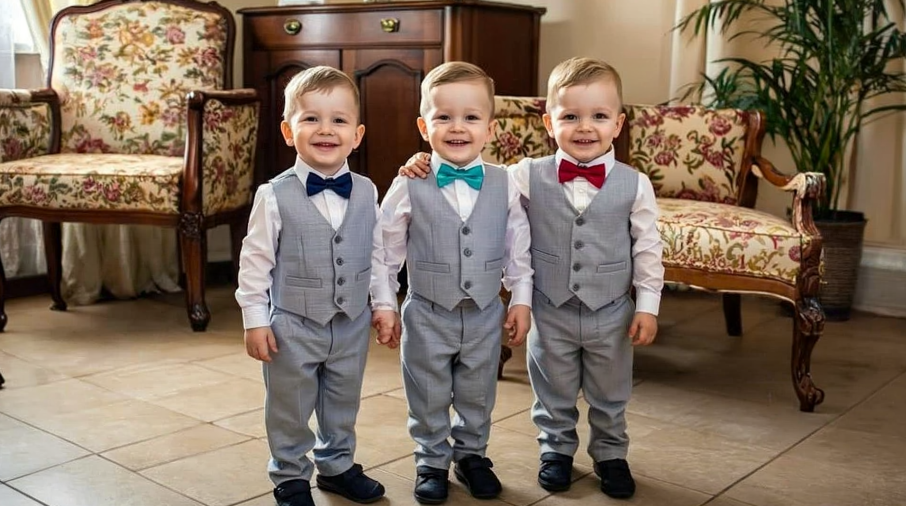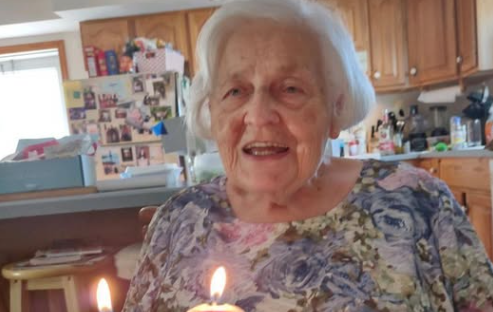Everyone always joked that we’d need color-coded bowties just to tell them apart.
So we did—blue, teal, red.
Three perfect little copies, right down to the dimples.
They finished each other’s sentences.
Had their own language.
Shared everything.
It was like raising one soul in three bodies.
But a few weeks ago, Teal—Eli—started waking up crying.
Not from nightmares.
From memories.
That’s what he called them.
He’d say things like, “Remember the old house with the red door?”
We’ve never had a red door.
Or, “Why don’t we see Mrs. Langley anymore?
She always gave me peppermints.”
We don’t know anyone named Langley.
Last night, he looked right at me and said, “I miss Dad’s old Buick.
The green one with the dented bumper.”
I was stunned.
He wasn’t talking about my car.
I drive a Honda.
And there’s never been a green Buick in our family.
At first, we reasoned it was imagination.
The boys were seven.
They told wild stories constantly—pirate ships, dinosaurs in the attic, fairies under the porch.
But this was different.
Eli’s eyes would glaze over when he spoke, as if he were somewhere else.
He wasn’t trying to impress anyone.
He genuinely believed what he was saying.
My wife, Marcie, tried to comfort him.
“Maybe you dreamed it, sweetie.
Dreams can feel real sometimes.”
Eli shook his head slowly.
“No.
I remember it.
The red door had a squeak when you opened it.
Mom would tell me not to slam it.”
“Mom” meant me.
But he wasn’t looking at me when he said it.
It was like I’d vanished, replaced by someone else in his head.
Marcie and I started writing down everything he said.
We intended to discuss it with his pediatrician.
Perhaps even a child psychologist if it persisted.
Then Eli started drawing.
Pages and pages of a house with a red door.
Always the same details: a chimney with ivy, a stone path, a small garden full of tulips.
His brothers, Max and Ben, would peek over his shoulder and say, “Cool house,” but they didn’t seem disturbed.
Eli wasn’t scared.
Simply… sad.
As if something precious had been taken from him.
One Saturday morning, I found him in the garage rummaging through boxes.
He looked up at me, hands dusty.
“Do we still have my old baseball glove?”
“You don’t play baseball, bud,” I said gently.
“I used to,” he said.
“Before I fell.”
I crouched down.
“Before you what?”
“Before I fell off the ladder.
The one Dad told me not to climb.”
He touched the back of his head.
“It really hurt.”
I stared at him.
There was a calm certainty in his voice.
Not fear.
Not confusion.
Simply remembering.
We made an appointment with Dr. Krause, his pediatrician.
She listened carefully, took notes, and recommended a child psychologist who specialized in early memory development.
“We’re not suggesting anything is amiss,” she assured us.
“But if these recollections are distressing—or disrupting his reality—it’s worth exploring.”
We booked the session.
The psychologist, Dr. Hannah Berger, was warm and kind.
Eli liked her instantly.
After two sessions, she told us privately, “This isn’t typical imaginary play.
He’s describing things with a level of detail and consistency that suggests a deeply rooted memory.
Some call it past-life recall, though I know that’s controversial.”
Past life?
I almost laughed.
I wanted a medical explanation.
A brain quirk.
Overactive imagination.
Not… reincarnation.
But Dr. Berger wasn’t advocating for any theories.
She simply stated, “Whatever the source, he’s processing something very real to him.
Do not dismiss it.”
That night, I searched online.
“Children who remember past lives.”
I delved into a myriad of stories.
A boy who remembered dying in a plane crash.
A girl who spoke fluent Swedish despite never hearing it.
Parents similar to us, torn between logic and something stranger.
One article mentioned a researcher named Dr. Mary Lin, who interviewed children with similar experiences.
She resided two states away.
I emailed her.
She replied the next day.
“I would be pleased to speak with your son.”
We arranged a video call.
Eli was shy at first, hiding behind me, but Dr. Lin had a gentle demeanor.
She asked simple questions.
“Do you remember your name from the other time?”
Eli nodded.
“Danny.”
“What about your last name?”
Eli frowned.
“Something like Cramer.
Or Kramer.
I can’t recall all of it.”
“Where did you live?”
“In a house with a red door.
In Ohio.
Near the train tracks.”
We live in Arizona.
None of us had ever been to Ohio.
Dr. Lin inquired if he recalled anything else—schools, friends, what had happened to him.
He hesitated, then whispered, “I was not supposed to climb the ladder.
But I wished to fix the flag.
I fell.
My head…”
He touched the same spot again.
Then he looked away, quiet.
Dr. Lin said she’d investigate.
She had access to old records and was familiar with past cases like this.
Three days later, she called me.
“I found a Daniel Kramer.
Resided in Dayton, Ohio.
Died in 1987.
Seven years old.
Fell from a ladder in his backyard.
Suffered a fractured skull.”
I felt a chill crawl up my arms.
She emailed me the obituary.
There was even a grainy photo.
The boy looked eerily like Eli.
Same eyes.
Same cowlick.
I did not know how to process the information.
I did not wish to frighten Eli—or his brothers.
So I told Marcie.
We stayed awake all night conversing.
She wept.
Not from fear.
From something harder to name.
Grief, perhaps.
Confusion.
Awe.
The next morning, Eli came into the kitchen and said, “I don’t think I’ll have the dreams anymore.”
“Why’s that, baby?” Marcie asked.
“Because I think I remembered everything I was supposed to.”
He sounded older than seven.
As if he’d concluded a chapter.
From that day on, the memories ceased.
He did not mention the red door or the Buick again.
He resumed drawing dinosaurs, not houses.
Playing tag with his brothers.
Laughing as if nothing had transpired.
We did not press.
We let it go.
A few months passed.
Then, one afternoon, I received a letter in the mail.
No return address.
Inside was a faded photo.
A house with a red door.
Chimney with ivy.
A small garden full of tulips.
A note, handwritten:
Thought you might want this. —Mrs. Langley
My hands trembled.
I showed Marcie.
She stared, speechless.
We’d never spoken to anyone about Mrs. Langley.
Except Eli.
And Dr. Lin.
I tried to contact Dr. Lin again, but her email bounced back.
Her website was gone.
It was as if she’d vanished.
Eli never inquired about the photo.
But he looked at it once, smiled softly, and said, “That’s it.
That’s where I left my favorite marble.”
Max and Ben are older now.
They are all fifteen, lanky and full of jokes.
Eli’s still the quiet one.
Thoughtful.
Gentle.
Sometimes I catch him staring at the sky, as if he’s remembering something again.
But he never utters a word.
Last week, I found an old shoebox under his bed.
Inside was a single marble.
Blue and green swirls.
On the bottom of the box, in shaky handwriting, was a note:
To Eli—from Danny. You found it.
I asked him where it came from.
He simply smiled and said, “Some things do not require explanation, Dad.”
I do not know if I believe in past lives.
But I believe in Eli.
I believe in the peace he found, the calm that came over him after all the memories ceased.
And I believe in the look he gave me that day—a look that said everything was fine now.
We raise our kids to become who they are.
But sometimes, they arrive in the world already carrying stories.
Some of those stories are not ours to comprehend.
Only to honor.
That’s what I’ve learned.
Allow your children to teach you.
Sometimes they know more than we do.
If this story moved you in any way, share it.
Perhaps someone else needs to hear it.




